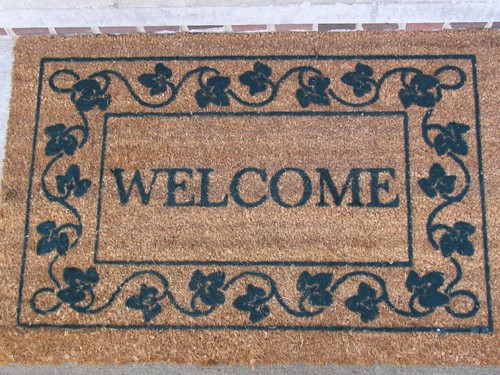Networking is awful. I hate it.
I say this as an introvert who fakes extroversion very well.
Maybe it was the moving abroad, but I had to learn to ignore the twisting in my
stomach and tame my quavering voice and just go meet the people. After all, the
people didn’t know I was sitting alone in my apartment wishing for someone to
talk to. They didn’t know I existed.
So I adopted a strategy: be a little bit pushy and a lot polite.
I still get nervous, but now at least I only eat lunch alone at conferences when
I want to, and I’ve met so many interesting people!
Let me clarify “pushy.” No one likes that person who won’t leave
them alone and doesn’t seem to be able to read body signals or tones of voice.
It’s more that I feel pushy. It feels
like I’m imposing because I’m trying to overcome my natural shyness. My head is
saying “Hiyouseemniceimgoingtotalktoyouokbemyfriend?!?” But my actual voice is
closer to, “Hey, did I hear you’re on the way to the convention center? I am
too. Would you like to share a cab?” Then we can chat (or not) on the way to
the convention area.
“Pushy” also means assuming a yes, as in “Sure I’ll share a cab.”
After all, most people (especially librarians) try hard to be polite and kind.
If your request is reasonable, why wouldn’t they say yes? Assuming a yes was
how I got Daniel Handler, Maira Kalman, Stephen Chbosky, and 30 different librarians
to talk into my phone for my “Live from ALA” podcast. I just asked with a
smile. Not everyone said yes, but most people did. (A few of those who said no
just needed a little further convincing that they had something worth listening
to.)
This doesn’t just go for in-person events. Twitter is a fantastic
way to get attention from people you want to know or work with. 140 characters
can start something wonderful, or it can be completely ignored. It’s a low
stakes way to make a connection.
On to the other half of this method: be a lot polite. Say thank
you for everything. Everything. Be gracious. Be willing to pay back a favor.
Negotiate for what you want with what they can give, and then throw in a bonus.
I sent a thank you email with a link to every person who gave me a sound bite
(except the few I didn’t have cards for, and the one who’s email didn’t work).
It all boils down to the idea that you don’t want any of the people who helped
you out to regret it. If you get what you want and then ignore them, or are rude,
or take the whole credit for something, they will not help you again. And
worse, they might not help out the next person who asks.
This won’t work every time. People are busy, they can’t say yes
to everything. But it’s worth the stress and the butterflies in your stomach to
give it a shot. So deep breath, exhale. Now ask that question.
Emily Thompson is the
Learning Technologies Librarian at SUNY Oswego where she spends her time trying
to get students and faculty excited about new stuff. She has a weekly podcast
you can find here http://edreach.us/littech-show/ and she tweets
@librarianofdoom.








